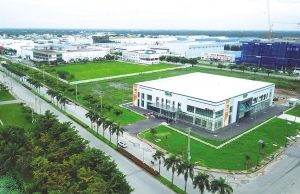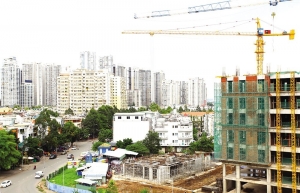Law tweaks can allure real estate investors
The Law on Land (LoL) and the Law on Residential Housing (LoRH) issued in 2013 and 2014, respectively, are among the main laws applicable to the property market. However, due to certain restrictions in the legal framework, foreign investment in Vietnam’s property market has not reached the level expected by authorities. The authorities are in the process of amending both laws, and the draft amendments have been published for public consultation.
 |
| Thang Nguyen-Special counsel, ACSV Legal |
Foreign investors can put money into Vietnam’s property market through directly buying and reselling residential houses, developing real property projects for sale or for lease, or acquiring existing projects. For non-nationals looking to buy residential properties in Vietnam, the draft amended laws contain no notable change compared to prevailing laws.
Currently, the total number of units owned by foreigners must not exceed 30 per cent of the total number of units in one condominium complex or 30 per cent of the total number of units in all condominium complexes in one administrative ward, or not exceed 250 separate property units (villas, adjacent houses) in one administrative ward.
The draft amended LoRH has not increased or loosened such a quota. Foreign buyers are still prohibited from buying properties in certain geographical areas due to national security concerns. Institutional overseas buyers can only use the purchased properties for their employees’ residences, and they cannot lease out such properties or use them as offices or for other purposes.
Without any key changes in the two laws, buyers will face the same restrictions in investing in property in Vietnam. This would include uncertainty in being able to remit sale proceeds offshore, inability to purchase many residential properties in one area, limited rights and more difficulty in obtaining a property ownership certificate compared to local buyers (unless the foreigner is married to a Vietnamese citizen or a Vietnamese person residing overseas), and only being entitled to own residential housing but not land use rights.
The authorities may need to adopt a different approach to foreign ownership of properties to kickstart a new wave of investment into Vietnam’s property market.
Of course, the concerns about national security and the need for an adequate housing supply for citizens are reasonable and need to be considered in the legislation process. A possible solution would be allowing foreign buyers to purchase and own residential properties with a higher or even unlimited quota in high-end projects located in areas without national security concerns and capital exceeding a certain threshold.
For foreign developers of residential housing projects, several restrictions remain unresolved in the draft amended laws. Firstly, regarding financing, the types of capital allowed to be raised for commercial development in the draft amended laws remain limited and do not include foreign loans. Overseas lenders still cannot take property as a collateral to secure payment obligations.
This makes it difficult for developers to raise offshore financing to develop their projects. Currently, a workaround is used and exists of a local bank acting as a security agent for the foreign lender. They subsequently take the proceeds from selling the property as collateral instead of the property itself. However, this is not an ideal solution for such lenders. Furthermore, the arrangement to have a local bank act as a security agent is not officially recognised in Vietnamese regulations.
Secondly, the authorities intend to exclude commercial housing and urban area projects from recovering land from existing land users by the state. Instead, developers can negotiate with land users directly for compensation. If this change is adopted, it will mainly be beneficial to land users and the State budget.
Foreign developers, on the contrary, will likely find it burdensome to negotiate compensation directly with local land users. They will also be disadvantaged compared to local developers who are savvy about local customs, market and land valuation practice. The authorities should carefully consider the impact of this proposal and create incentives for developers to negotiate a fair value with land users.
Incentives might involve counting the paid compensations towards the project’s capital or deducting the compensations against payable taxes.
If foreign developers cannot successfully negotiate the compensation and clearance with land users, they still can rely on land use rights auctions and bidding mechanisms to receive the land from authorities. However, these mechanisms should be more transparent and comprehensible for such developers to take an interest and participate within these procedures.
In addition, there is no separate regulation for foreign developers, which can make navigating Vietnam’s laws and administrative procedures tricky for them. Considering that many laws and authorities govern property development, it is onerous for inexperienced foreign developers to obtain all the necessary approvals for project development on time. This will prolong the project development process and increase expenses.
Besides that, the different laws should be more consistent to allow more flexibility for such investors in conducting a merger or acquisition. Currently, such transactions by non-nationals in the property market are mostly carried out via the acquisition of project companies compared to project acquisition due to the complexity of the legal framework.
If the current drafts of the amended LoL and LoRH are to be officially passed, with the aforementioned outstanding issues remaining unresolved, many potential foreign investors will be discouraged from entering the market, and we will likely not see a significant increase in foreign funding in this area.
 | Industrial real estate boasting further room for growth Vietnam’s industrial real estate sector is growing rapidly, with demand among investors particularly strong. |
 | Land law considerations for foreigners With the implementation of the Law on Land, many foreign businesses have encountered multiple challenges related to real estate while investing in Vietnam, Pham Duy Khuong, managing director of ASL Law, explains why the country must remove these issues as soon as possible to keep Vietnam attractive. |
What the stars mean:
★ Poor ★ ★ Promising ★★★ Good ★★★★ Very good ★★★★★ Exceptional
Related Contents
Latest News
More News
- Dong Nai experiences shifting expectations and new industrial cycle (January 28, 2026 | 09:00)
- An Phat 5 Industrial Park targets ESG-driven investors in Hai Phong (January 26, 2026 | 08:30)
- Decree opens incentives for green urban development (January 24, 2026 | 11:18)
- Public investment is reshaping real estate’s role in Vietnam (January 21, 2026 | 10:04)
- Ho Chi Minh City seeks investor to revive Binh Quoi–Thanh Da project (January 19, 2026 | 11:58)
- Sun Group launches construction of Rach Chiec sports complex (January 16, 2026 | 16:17)
- CEO Group breaks ground on first industrial park in Haiphong Free Trade Zone (January 15, 2026 | 15:47)
- BRIGHTPARK Entertainment Complex opens in Ninh Binh (January 12, 2026 | 14:27)
- Ho Chi Minh City's industrial parks top $5.3 billion investment in 2025 (January 06, 2026 | 08:38)
- Why Vietnam must build a global strategy for its construction industry (December 31, 2025 | 18:57)

 Tag:
Tag:



















 Mobile Version
Mobile Version